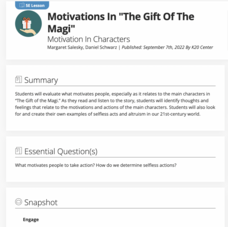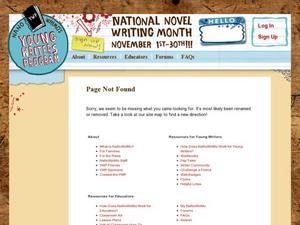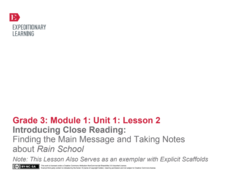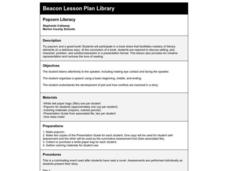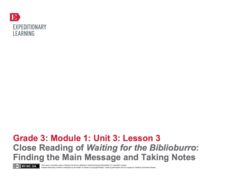K20 LEARN
Criminal Motivations: Irony and Characterization In "The Cask Of Amontillado"
Edgar Allan Poe's short story "The Cask of Amontillado" is a bit of a puzzle. Critics have long debated Montresor's motives for killing Fortunato. Young scholars examine examples of the three types of irony (verbal, dramatic, and...
K20 LEARN
Motivations In "The Gift Of The Magi": Motivation In Characters
O. Henry's short story, "The Give of the Magi," launches a study of what motivates people to act as they do. Class members identify what they believe are the motivations of the characters in O. Henry's tale and then craft a one-page...
Curated OER
Mini-Lesson Planning for Inferences
Making inferences and drawing conclusions is a key component to successful active reading. Encourage your class to use context clues and prior knowledge to infer different elements of a story, including the setting, plot, and character...
Curated OER
Lesson Plan 5: Creating a Supporting Character
As a class, young writers learn how to develop a strong supporting character. They think and discuss a good friend they know, they use that friend as a basis for a potential supporting character. They create a supporting character as a...
US Institute of Peace
Identifying Conflict Styles
Are you a peace-keeper or a problem-solver? Explore conflict management styles through a instructional activity, fourth in a 15-part series, that combines individual assessment and collaborative work. Groups learn the basic tendencies of...
US Institute of Peace
Characteristics of Peacebuilders
Can anyone become a peacebuilder? A lesson on character education challenges scholars to examine the characteristics of well-known peacebuilders. Pupils then look within themselves to discover their own strengths as they relate to...
Curated OER
Lesson Plan 4: Creating Main Characters
Creating a good main character is a must when writing a creative narrative or novel. Elementary aged writers create main characters for the novel they are writing. They first use themselves as a models, then create a character as a...
Shakespeare in American Life
"We Few, We Happy Few": Motivational Speech in Henry V
Class members may "think themselves accurs'd" when they first hear of an assignment that asks them to create a motivational speech. After studying the Saint Crispin's Day speech from Shakespeare's Henry V; however, they will count...
Simon & Schuster
Curriculum Guide to: A Tale of Two Cities by Charles Dickens
A Tale of Two Cities is the core text for five lessons in a Curriculum Guide for Charles Dickens' famous novel. To begin, scholars examine Dickens' use of anaphora in the first line of the novel. Next, they compare the point of view in a...
US Institute of Peace
Responding to Conflict: Negotiation—Identifying Wants and Needs
Let's make a deal! Are real negotiations as simple as they are in the game show? Scholars learn the art of negotiation during the 8th lesson in a series of 15. The activity kicks off with a fun group negotiation, then explores the topic...
EngageNY
Introducing Close Reading: Finding the Main Message and Taking Notes About Rain School
This second lesson in a larger unit is perfect for the beginning of the year because it explicitly teaches 3rd graders how to use close reading skills by identifying unfamiliar words, figuring out the gist, and defining important...
Curated OER
Ornithology and Real World Science
Double click that mouse because you just found an amazing lesson plan! This cross-curricular Ornithology lesson plan incorporates literature, writing, reading informational text, data collection, scientific inquiry, Internet research,...
EngageNY
Close Reading of That Book Woman: How Did People Access Books in Rural Areas of the United States?
For this ninth lesson plan in a larger beginning-of-the-year unit, close reading skills are used independently to find the gist of the story That Book Woman. Rereading for important details is the targeted skill to unlock a deeper...
Marion County Schools
Popcorn Literacy
Popcorn is a tasty part of a culminating activity designed to motivate readers to share important literary elements. The popcorn fills the inside of a white paper bag that is transformed on the outside into a presentation tool with the...
US Institute of Peace
Responding to Conflict: Active Listening
Did I hear you right? You need a great lesson on active listening? Through large- and small-group activities, learners differentiate between poor and excellent listening skills. The resource, 7th in a series of 15, focuses on active...
US Institute of Peace
Making a Difference: Becoming a Peacebuilder
Being an agent of change is no easy task! What are some of the common challenges that peacebuilders face every day? The 14th portion in a series of 15 explores the lives of peacebuilders. Grouped pupils discuss these challenges before...
US Institute of Peace
Responding to Conflict: Mediation
What happens when two parties can't come to agreement? Scholars explore the role of a mediator through part 10 of a 15-part series of peacebuilding lessons. Through individual work and role play, pupils brainstorm solutions until they...
US Institute of Peace
Responding to Conflict: Negotiation Role-Play
After a lesson like this one, your class won't hesitate to negotiate! Pupils pair up and negotiate opposing sides of a conflict during the ninth installment in a 15-part series. Once they determine their wants and needs, individuals...
US Institute of Peace
Peacebuilders in Action
What contributions have great peacebuilders made to our society? Civic-minded scholars take an in-depth look at people who have made a difference world-wide during the 12th lesson in a 15-part series. After researching facts about their...
Orange County Department of Education
Katie's Trunk
Fifth graders read the story of "Katie's Trunk". They identify the traits of integrity and fairness in the characters John Warren and Katie. Students explore how people can experience the same event but interpret it differently. They...
Recorded Books
Teacher's Guide: The Pinballs
Dive your class into the novel The Pinballs by Betsy Byars with the support of this reading guide. Including short answer questions, a multiple choice comprehension quiz, and extension activities, a variety of materials are provided for...
Shakespeare Uncovered
Women’s Roles in As You Like It
“There is nothing that becommeth a maid better than soberness, silence, shamefastness, and chastity, both of body & mind.” This line, from Thomas Bentley ‘s The Monument of Matrons published in 1582, typifies the way women were...
EngageNY
Close Reading of Nasreen's Secret School: How Do People Access Books in Afghanistan?
Third graders continue to practice the close reading skills of capturing the gist and reading again for important details in the sixth lesson in a larger unit. This is a great beginning-of-the-year unit for establishing visible thinking...
EngageNY
Close Reading of Waiting for the Biblioburro: Finding the Main Message and Taking Notes
Expose your class to Waiting for the Biblioburro, narrative nonfiction that will act as the bridge between ficiton and informational texts to come. Class members do a close reading of the text, looking at excerpts instead of the whole...



